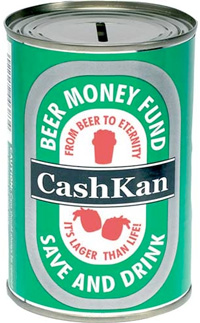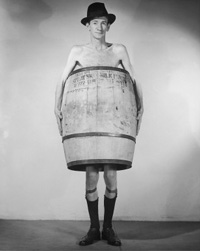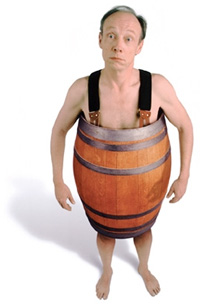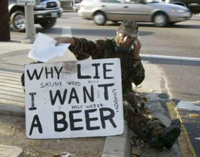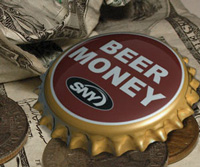
Jim Cramer, the knucklehead financial dramatist who hosts the Mad Money program on MSNBC, tackles the beer wars between the major brewers, and trips over himself all over the place. You’d think no one would would watch his show or take his advice after Jon Stewart exposed him so completely earlier this year, but apparently he’s as popular as ever. That’s surprising to me given that his track record is about as good as the average weatherman. The financial markets being complex and interconnected systems, his simple-minded advice seems doomed to failure for that reason alone, but he still promises on his website that you can “Make Money With Money Manager Jim Cramer.” Caveat emptor, I guess. Maybe it’s just me, but I don’t really like having my advice yelled at me while waving cheap props in my face.

Like most financial analysts I’ve seen talk about the brewing industry lately, Cramer has no real sense of what’s going on or the history involved with why the industry is where it is today. And so they seem to attack in a vacuum, with no understanding of it at all. You can check out his screed here about the end of the beer wars.
He details how the beer world until recently was dominated by eight companies: Bud (Anheuser-Busch) Coors, Corona (Grupo Modelo), Dos Equis (FEMSA / Cervecería Cuauhtémoc Moctezuma), Heineken, Miller, Molson and Pabst. But now that InBev bought A-B and Coors and Miller merged their operation in the U.S., “suddenly” — to use Cramer’s surprising words — “we have a near oligopoly?” First of all, these eight are not the full picture. He’s ignored Kirin, Carlsberg, Asahi, and Diageo; all in the top 10 largest beer companies globally. That’s not to mention Radeberger, Tsingtao, Foster’s and others just below the Top 10.
Then there’s the “suddenly” that Cramer keep and his gang of idiots keep feigning. Brewery consolidation has been going on literally since Prohibition ended, 75 years ago. From roughly 1,000 breweries re-opening in the years after alcohol became legal again to 1984, when there were only 44 left, and the top six accounted for 92% of beer sold, mergers & acquisitions have been on-going. This is hardly a new situation. And that’s just the U.S. The same thing has been happening around the world, both locally and in global markets. We’ve been referring to the “Big 3” — A-B, Coors & Miller — for decades. Now that there are two it’s a problem? “Suddenly?” Please …. give me a break.
Recently, ABI announced they would raise prices this fall, and MillerCoors followed suit … like they’ve always done, again for years and years. But Cramer and others reacted as if this is the first time such a thing has happened. It’s not. The major beer companies, both domestic and import, have been following one another’s lead (usually A-B) for as long as I can remember, and undoubtedly longer.
The New York Times has a similar rant in, of all things, their “breaking Views” section called Rising Beer Prices Hint at Oligopoly. I find it funny that something going on without change for decades could be considered a “breaking view,” but I guess that’s what happens when you ignore history.
Anheuser-Busch InBev — purveyor of the president’s preferred brew, Bud Light — and MillerCoors, a joint venture between SABMiller and Molson Coors, are raising prices at the same time, during a recession and while beer demand is slumping. With 80 percent of the market between them, the move almost begs for an antitrust review. [my emphasis.]
Hello, is anybody home? They’ve been raising prices “at the same time” forever. It means nothing. These are not “hints,” but simply business as usual. What the hell is wrong with these people?
Cramer goes on to rave that because they’re both raising prices that somehow that signals an end to the competition between them. He states that they’ve been “going from competitors absolutely killing each other to a slap happy international beer oligopoly.” He’s more daft than I previously thought, and that’s saying a lot.
He keeps calling Labatt, “Labott,” and incorrectly identifies it with InBev. It is owned by InBev outside the U.S., but domestically it’s owned by North American Breweries. His audience is primarily American, so that makes no sense. Cramer’s advice about buying MolsonCoors stock I can’t say I understand completely and he throws around quite a few numbers that don’t seem to either support his conclusions or even appear rational. He’s mildly clever when he says “Give Beer A Chance” with a peace symbol made of beer cans, but I’d prefer he did his homework instead and knew what the hell he was talking about. What a maroon.
The beer wars, of course, are hardly over.




